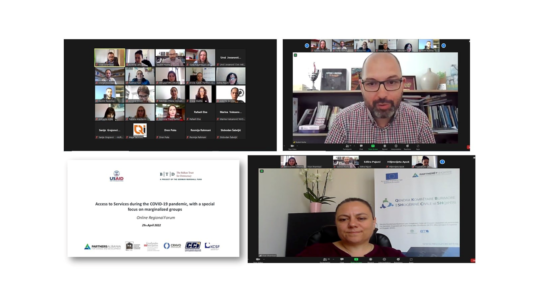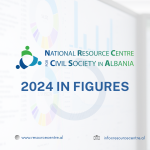The Kosovar Foundation for Civil Society organized a regional forum on April 29, 2022, with the topic: “Access to Services during the pandemic, with a special focus on marginalized groups.” The goal of this event was to discuss the impact of the pandemic on marginalized groups, the role of civil society organizations and the government’s pandemic response. Most importantly, understand how government policies and CSOs affected the daily lives of citizens from disadvantaged groups.
The forum was divided into three sessions:
– Session 1: Opening remarks;
– Session 2: The disproportional impact of the COVID-19 pandemic on marginalized groups and government’s response;
– Session 3: Civil Society advocacy efforts to improve access to education for marginalized groups during the COVID-19 pandemic.
The discussion began with the opening remarks delivered by the Executive Director of KCSF, Taulant Hoxha, who addressed the guest speakers and panelists by providing a brief summary of the advocacy efforts of the civil society during the last two years of the COVID-19 pandemic. Afterward, Ariola Agolli, Manager of the National Resource Centre at Partners Albania for Change and Development, talked about the main objectives of the project (Fostering regional cooperation and policy responses in times of crises) as well as the importance of organizing thematic regional forum as part of the project. In addition, Ms. Agolli emphasized the need and importance to share best CSO practices.
The topic of the first-panel discussion was “The disproportional impact of the COVID-19 pandemic on marginalized groups and government’s response.” This discussion focused on the disproportional impact on marginalized groups and the most affected group/community during the COVID-19 pandemic. Moreover, the discussion focused on the government’s response and the type of assistance that the government provided to marginalized groups. The last part of the discussion was oriented toward the role of the CSOs and their impact. In particular, the discussion had a special focus on the cooperation and communication between CSOs and the government.
The first panel discussion consisted of four panelists: Adile Shaqiri, Head of Social Services Division at the Ministry of Finance, Labor, and Transfers of Kosovo; Adelina Berisha, Program Manager at the Kosovo Women’s Network; Gresa Stublla, Provider of physiotherapeutic services at HANDIKOS, and Adelajda Alikaj, Executive Director at Streha NGO in Albania.
Adile Shariri reported a significant increase in domestic abuse, with women and children as the most affected group. Similarly, she stated that there has been an increase in demand for social services provided by the Ministry. The second panelist, Adelina Berisha, argued that the state and respective institutions should be more prepared when dealing with global crises such as COVID-19 because the burden falls always on women. She also argued that the cooperation between the Ministry and CSOs has been minimal. Furthermore, Gresa Stublla provided a brief background on the impact of the pandemic on people with disabilities. She argued that people with disabilities found it extremely difficult to live their lives during the past two years, especially at a time when the Government imposed physical distancing and curfews, as people with disabilities should often be accompanied by a second person to assist them with their needs. Finally, Adelina Alikaj, joined from Albania and provided her perspective on LGBTIQ. She said that the number of people that were offered sanctuary drastically went down, which seriously impacted their advocacy efforts. However, on a positive note, she stated that “Streha” provided online psychological services.
The second and final panel discussion focused on: “Civil Society advocacy efforts to improve access to education for marginalized groups during the COVID-19 pandemic.” This discussion had a niche focus on primary and secondary education in marginalized communities. In particular, the discussion focused on online schooling and children’s needs. Moreover, the panelists elaborated on the role of CSOs toward improving access to education for marginalized groups, specifically, their fundraising campaigns to purchase technological equipments for online schooling.
Similarly, the second panelist consisted of four panelists: Besmira Thaqi, Officer of the Division of Child Education at the Ministry of Education, Science, Technology, and Innovation of Kosovo; Donjetë Kelmendi, Executive Director at the Coalition of NGOs for Child Protection; Gjina Kacaniku, Project Officer at the Kosovo Center for Distance Education; and Adriatik Hasantari, Executive Director at Roma Active in Albania.
Besmira Thaqi hinted that supplying children with equipment in order to ensure access to online schooling has been difficult. The Ministry did not possess enough funds to provide tablets or laptops for children in need. Donjetë Kelmendi said that children with disabilities have been the most vulnerable group during the pandemic. She argued that the Government’s policy response has been general, instead of tailored policy to accommodate the needs of children with disabilities. On the other hand, Gjina Kacaniku said that the organization she works for has provided a handful of technological equipment for children in need and were able to mitigate some shortages faced by public institutions. Finally, Adriatik Hasantari provided his Albanian perspective on the topic focusing on the Roma community. He stated that the Roma community is not a priority for the Government of Albania because there are small in numbers and do not bring votes. However, he argued that CSOs were able to fill in the vacuum created by the public institutions.






